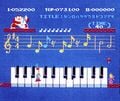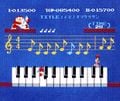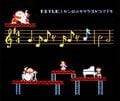Donkey Kong no Ongaku Asobi
The title of this article is official, but it comes from a non-English source. If an acceptable English name is found, then the article should be moved to the new title.
Template:Infobox Donkey Kong no Ongaku Asobi is a canceled game set for release on the Family Computer. It would have followed Popeye no Eigo Asobi and released alongside Donkey Kong Jr. Math as one of the edutainment games based on the Famicom's launch titles.
Donkey Kong no Ongaku Asobi starred the cast of Donkey Kong and Donkey Kong Jr. The game never surfaced, and seems to have only been announced in 1983 in a Japanese handbill as well as magazines.[1][2]
Game Modes
The game featured two modes: Music Quiz and Donkey Band. Two songs are shown on the three released promo pictures: the 1962 Japanese translation of "I've Been Working on the Railroad" by Satoshi Saki and the 1960 nursery rhyme "Inu no Omawari-san" by Yoshida Sato and Ai Tsuchida.
Music Quiz
Music Quiz would seem to involve making bassist Donkey Kong play displayed notes by hammering piano keys with Mario and Lady. Screenshots of the game revealed one- and two-player variations:
- One Player: Mario plays the notes, with Lady and her hammer on the sidelines.
- Two Players: Both Mario and Lady play the notes; Mario is Player 1, while Lady is Player 2.
Donkey Band
Donkey Band would be played as a karaoke styled game in which included the player singing into the Famicom player 2 controller microphone. Donkey Kong is on bass once more with Donkey Kong Jr. playing drums, Mario playing a grand piano and Lady as a vocalist.
Cancelation
According to Ichirou Sakurada, a former Hudson Soft employee, Donkey Kong no Ongaku Asobi's main reason for cancelation was that it featured many songs originally written by Seiko Matsuda, a popular Japanese singer. Nintendo lost the rights to these songs (or possibly never had them to begin with) before the game's scheduled release, and it would have been difficult to import new music over them. Furthermore, there were very few songs in the game at all, with the limited storage capacity of early Famicom games not being able to hold much data. This cartridge was given to Hudson Soft during their development of the Family BASIC accessory as sample software.[3]
Gallery
Names in other languages
| Language | Name | Meaning | Notes |
|---|---|---|---|
| Japanese | ドンキーコングの音楽遊び[?] Donkī Kongu no Ongaku Asobi |
Donkey Kong's Music Play |
Trivia
- Although the game was never released, Lady, or rather, Pauline's role as the vocalist in a band was integrated into Super Mario Odyssey, with her acting as the lead singer of a band.
References
- ^ Donkey Kong’s Fun With Music [NES – Cancelled]. Unseen 64. Accessed June 16, 2008.
- ^ Cifaldi, Frank. Nintendo’s (First) Lost Donkey Kong Game. The Video Game History Foundation. Retrieved November 10, 2018.
- ^ https://famicoms.net/blog-entry-2236.html (Japanese)


